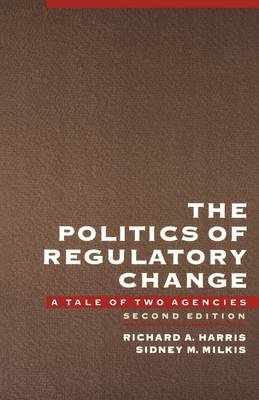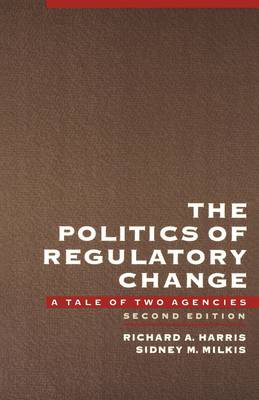
- Afhalen na 1 uur in een winkel met voorraad
- Gratis thuislevering in België vanaf € 30
- Ruim aanbod met 7 miljoen producten
- Afhalen na 1 uur in een winkel met voorraad
- Gratis thuislevering in België vanaf € 30
- Ruim aanbod met 7 miljoen producten
Zoeken
The Politics of Regulatory Change
A Tale of Two Agencies
Richard A Harris, Sidney M Milkis
Paperback | Engels
€ 183,45
+ 366 punten
Omschrijving
The past three decades have brought remarkable change in American regulatory politics. The re-emergence of public interest movements in the sixties and seventies raised fundamental questions about our market economy and dramatically expanded the government's regulatory role in the protection of public health, the consumer, and the environment. The far-reaching effects of this new regulatory regime in turn precipitated a counter-movement to restrict social and economic regulation spearheaded by the Reagan administration. In their first edition of The Politics of Regulatory Change, Richard Harris and Sidney Milkis assessed the long-term consequences of the Reagan administration's attempt to drastically curtail social regulation through an in-depth study of how two of the most influential regulatory agencies, the Federal Trade Commission and the Environmental Protection Agency, were affected by administration reforms. Now with their second edition, Harris and Milkis continue their assessment, creating a completely revised edition that includes coverage of the changes in regulatory politics during the Bush and Clinton administrations. They conclude that the essential elements of the 'public lobby regime' remain intact, even as the successive deregulatory assaults on that regime in the 1980's and 1990's have polarized Washington not simply over public policy but more fundamentally over the just ends of the American political system.
Specificaties
Betrokkenen
- Auteur(s):
- Uitgeverij:
Inhoud
- Aantal bladzijden:
- 432
- Taal:
- Engels
Eigenschappen
- Productcode (EAN):
- 9780195081916
- Verschijningsdatum:
- 11/04/1996
- Uitvoering:
- Paperback
- Formaat:
- Trade paperback (VS)
- Afmetingen:
- 139 mm x 208 mm
- Gewicht:
- 453 g

Alleen bij Standaard Boekhandel
+ 366 punten op je klantenkaart van Standaard Boekhandel
Beoordelingen
We publiceren alleen reviews die voldoen aan de voorwaarden voor reviews. Bekijk onze voorwaarden voor reviews.








